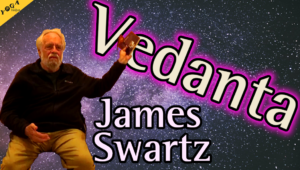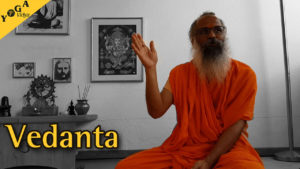In the satsang we create a sattvic atmosphere that makes it easier
to focus on the knowledge. It is important to keep the knowledge
active when the mind is rajasic or tamasic. When the values are
assimilated the mind stays sattvic and the knowledge stays active.
A change in your lifestyle may be necessary to make the mind
sattvic enough. Deliberate thinking is observing the mind, step
back and think about it before you act. If necessary pause, collect
your thoughts, you can edit your thoughts as they come up. Pay
attention that the information is appropriate, kind, timely and
credible. Impulsive thinking has the need to react immediately. 11.
Dispassion towards sense objects, for example music, food, sex. No
obsession, except obsession for Vedanta. Assimilating these values,
starting with an intellectual understanding brings you a lot of
experiential and emotional satisfaction. 12. Renunciation and
Austerity. Eagerness to get rid of things and to live simply. Do not
accumulate stuff. 13. Absence of egoism. It’s about a simple
recognition about the difference between my (real) Self and the ego
(reflected self). Sadhana: Whenever you say the ‘I’ in the day-to-day
activities ask yourself which ‘I’ is meant. This helps to
discriminate. Keep track of your speech. Keep a short leash on your
ego and let it walk in front of you. 14. Appreciation of time. Don’t
waste time and go on with self-inquiry. 15. Absence of ownership. Is
it your body or your children? Everything comes from isvara.
Sadhana: Pay attention to the word ‘mine’. 16. Absence of
excessive attachment to loved ones. Serve the people in your field
with love but don’t get excessively attached. 17. Sameness of mind
under all circumstances. Cultivate the value of a quiet mind and for
sattva. Read the book Yoga of the three energies. Importance of
the management of the gunas. You can remove most of the
physical pain with guna management. Most of the daily pains are
caused by blocked prana or tamasic energy. 18. Non-dual devotion
to God. 19. Love of solitude. You can hear the silence speaking.
Gradually work to it if you have a busy life. 20. Absence of craving
for company. People can be in your life but you should have no
need for it. 21. Constant practice of self-knowledge. 22. Value for
completing or resolving things. Too much agitation prevents you
from finishing projects and brings to starting new ones. Karma yoga
reduces your karmic load. The degree to what you reduce your
karmic load is the degree to what your mind is peaceful. Tamasic
people don’t want to complete things. Rajasic people want to
complete things but they are too busy to do the completion.
Consequence is that they are always agitated. 23. Precaution,
deliberation and restraint. Think ahead and make a plan before you
judge. Value for holding back. Rajasic people want to do things
immediately. If you can’t hold on you find yourself doing a lot of
things you don’t have to do. 65. Offering all activities to the Lord,
one should direct negative feelings – desire, anger and pride – to
Him. 66. Transcending the gunas, the devotee should act only out
of pure love of God and remain perpetually in the relationship of a
servant to his master or a lover serving her beloved. 67. Among the
Lord’s devotees, the greatest are those who are dedicated solely as
intimate servants. Sakhya bhava and further bhavas. Secret love
affair with God behind the back of your husband. What is your
dominant way to express your love? Love with understanding is
better than only emotional love, for example sakhya bhava. 68.
Conversing among one another with throats choked, hair
standing on end and tears flowing, the Lord’s intimate servants
purify their own followers and the whole world. 69-83. 84. Anyone
who has faith in these auspicious teachings will attain non-dual
devotion. Indeed he or she will attain unconditional love.
More: Vedanta Seminars.
More on: Vedanta.
Learn more about: Yoga Vidya.
You can sign up for: our online seminars.
You can also support us by: donating.
Podcast: Play in new window | Download
Subscribe: RSS









